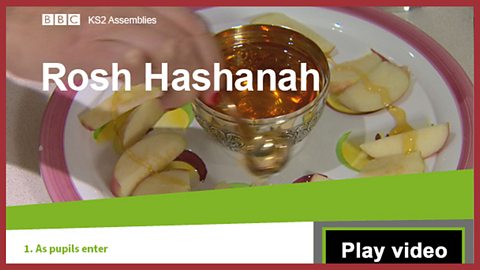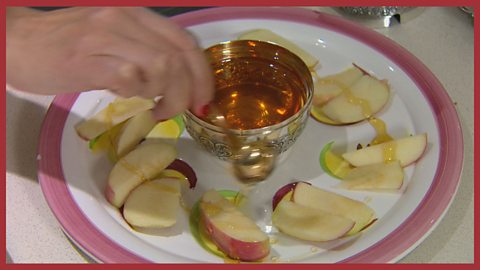Themes: the festival of Rosh Hashanah and the Jewish New Year; being responsible for our actions; asking for forgiveness; aspirations for the future.
Summary: Rosh Hashanah is the Jewish New Year festival. It lasts for two days and commemorates the creation of the world. Jews believe that God keeps a record of every person's good and bad deeds across the year and on the first day of the new year makes a judgement about them. This final judgement is made on Yom Kippur - which means Day of Atonement. In 2024 Rosh Hashanah begins on on Wednesday 2 October and Yom Kippur follows on 11 October.
Resources: The assembly framework to download / print and an image of a plate of apples and honey to display.

The video
CHARLIE: The dates of all our festivals come from the Hebrew calendar, so instead of January, the Jewish New Year begins in autumn. We mark it with a two-day celebration called Rosh Hashanah. We've got apple and honey here and the apple and honey symbolises the sweet New Year. It tastes really nice. It's really sweet.
During Rosh Hashanah, we spend a lot of time in the synagogue.
One of the rituals there is the blowing of the shofar horn. It's a ram's horn and it's one of the world's oldest-known wind instruments. I want to see if I can get a note out of it, so family friend Ben is going to show me.
BEN: The shofar acts like an alarm clock. It wakes everybody up in the synagogue. So anybody that would hear it, would remember to do teshuva, to repent, to return to their maker for a good year ahead.
CHARLIE: There are different ways to blow the shofar horn. Some of the notes are really long.
BEN: You put that to your mouth. Tekiah is one note. Try and make it last the best part of about six, seven seconds.
SHOFAR RASPS
BEN: OK, tell you what. Do a raspberry. Yeah? Close. Go like this… That's it, that's all you have to do on the front.
SHOFAR SOUNDS
BEN: You've got it!
CHARLIE: Right, I'm going to try and do it for seven seconds.
BEN: Sure.
SHOFAR SOUNDS
BEN: That was awesome. That would have counted.
CHARLIE: Yes!
BEN: You will be a ba'al tekiah one day, I am sure.
CHARLIE: A bit hit and miss, but once it's there, I think it's quite good.
SHOFAR SOUNDS
CHARLIE: The blowing of the shofar starts a ten-day period. This ends with Yom Kippur, the holiest day of the year. Many Jewish people like my dad fast for 25 hours and spend most of the day praying. We believe this is a time of forgiveness after being judged by God during Rosh Hashanah. Bit scary, bit intimidating. That's how it feels to be judged by God. You can worry a lot that you might not be forgiven. It's also good cos then you know what to do good for next year and what not to do. After, I feel very happy. Definitely that a weight has been lifted off my shoulders and just look forward to the next year, which hopefully would be a good one.
11-year-old Charlie tells us about the two-day celebration of Rosh Hashanah - the Jewish New Year celebration.
We see Charlie enjoying the traditional meal of apple and honey (symbolising a 'sweet New Year'). We join Charlie in the synagogue, where he tries blowing the shofar - a ram's horn that is used during the festival. Charlie explains that the blowing of the shofar begins a period of ten days, known as the Days of Repentance, which ends with Yom Kippur - the holiest day of the year.
It's a time of fasting and prayer and Charlie says it can also be an anxious time, worrying about God's forgiveness. At the end he is happy: he feels like 'a weight has been lifted off his shoulders' and he knows what he should do in the coming year to make it a good one.
Duration: 3' 06"
Final words: '…which hopefully would be a good one.'
Video questions
- What is the Jewish new year festival called? (Rosh Hashanah)
- What meal does Charlie show us at the beginning of the video? (Apple and honey)
- What is the Jewish place of worship called? (The synagogue)
- What does Charlie blow in the synagogue and what is it called? (A ram's horn - called a shofar)
- What does Charlie say his father does during Rosh Hashanah (Fast for 25 hours and spend time in the synagogue praying)
- What does Charlie say at the end about his feelings at this time of year? (That it can be a worrying time but that at the end of the festival he feels happy because he knows what he must do to make the new year a good one)

Key links
Assembly framework (pdf) document
Download / print the assembly framework ready for use

Image: a plate of apples and honey. image
Click to display image full size


Suggested framework
1. Entry
An opportunity to play a piece of music as the assembly gathers. You could play the instrumental version of one of the suggested songs (see below).
2. Introduction
Begin by wishing everyone a 'Happy New Year!' Allow a moment for the assembly to feel bemused before going on to explain that 1 January is just one of many new year celebrations. For example, Chinese (Lunar) New Year can fall in either January or February. And there's another new year - the Jewish New Year, called Rosh Hashanah - which is celebrated in the Autumn at about this time of year. Tell everyone that they are going to watch a short video in which a Jewish boy called Charlie will explain what happens at Rosh Hashanah and why the festival is important to him, his family and community.
3. The video
Play the video. The duration is 3' 06" and the final words are: '…which hopefully would be a good one.'
4. After the video - Time to talk
You could begin by asking the Video questions (see above) to aid recall of the film and comprehension of it.
Then lead a discussion by focusing on what Charlie says at the end of the film. You may wish to repeat some of his words beforehand: 'You can worry a lot that you might not be forgiven. It’s also good, because then you know what to do good next year and what not to do. After I feel very happy, definitely that a weight has been lifted off my shoulders, and just look forward to the next year which hopefully will be a good one.' Then ask the following:
- How does it feel to be forgiven?
- Can you think of a time when you’ve forgiven someone?
- Do you think it’s right that we try to find forgiveness? Why?
5. Opportunity to sing
Suggestions from BBC collections below.
6. Opportunity to reflect
At the end of the video today Charlie described how having forgiveness was like 'lifting a weight off his shoulders'…
Saying ‘sorry’ can often seem really hard to do…
Sometimes we’re slow to apologise, even when we know we should…
Think to yourself about an occasion when someone has said sorry to you…
Or when you’ve said sorry to someone else…
How did it feel? Was it like having a weight lifted from your shoulders…?
If there’s someone you should say sorry to perhaps today can be the day you do it.
7. Opportunity for prayer
Dear God
Thank you for the exciting times each new year brings.
Help each of us to care for one another and to treat others as we ourselves wish to be treated.
And to remember that forgiveness can be like lifting a weight from our shoulders.
Amen.

Suggested songs
Song: 'While we live we learn' (All about our school, no 3. Vocal version)
While we live we learn, (while we live we learn,)
While we learn we grow, (while we learn we grow,)
And the more we grow, (and the more we grow,)
So the more we know, (so the more we know,)
And the more we know, (and the more we know,)
Then the readier we will be
For all life's big adventures
And all life's mysteries.
While we live we learn, (while we live we learn,)
While we learn we grow, (while we learn we grow,)
And the more we grow, (and the more we grow,)
So the more we know, (so the more we know,)
And the more we know, (and the more we know,)
Then the readier we will be
For all life's big adventures
And all life's mysteries.
For all life's big adventures
And all life's mysteries.
'God is watching over you' (All about our school, no 7)
God is watching over you,
When you lay down to sleep,
When you wake he will keep
Always watching over you,
Now and forever more.God is watching over you,
When you lay down to sleep,
When you wake he will keep
Always watching over you,
Now and forever more.
Now and forever more.
'Father, hear the prayer we offer' - Come and Praise, no 48

